Alan Turing: why the tech world's hero should be a household name
- Published
The life and achievements of Alan Turing - the mathematician, codebreaker, computer pioneer, artificial intelligence theoretician, and gay/cultural icon - are being celebrated to mark what would have been his 100th birthday on 23 June.
To mark the occasion the BBC has commissioned a series of essays to run across the week, starting with this overview of Turing's legacy by Vint Cerf.
Rory Cellan-Jones gets a sneak preview of an exhibition dedicated to the life of work of scientists and computer pioneer Alan Turing.
I've worked in computing, and more specifically computer networking, nearly all my life. It's an industry in a constant state of innovation, always pushing beyond the limits of current capability.
It is sometimes said that "broadband" is whatever network speed you don't have, yet!
Things we take for granted today were, not that long ago, huge technological breakthroughs.
Although I've been lucky enough in my career to be involved in the development of the internet, I've never lost sight of the role played by my predecessors, without whose pioneering labour, so much would not have been accomplished.
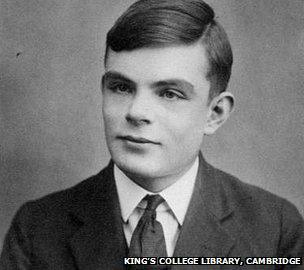
Turing studied mathematics at King's College, Cambridge before obtaining a PhD from Princeton University in the US
This year, in the centenary of his birth, there is one man in particular who is deservedly the focus of attention: Alan Turing.
Turing was born into a world that was very different, culturally and technologically, yet his contribution has never been more important.
His is a story of astounding highs and devastating lows. A story of a genius whose mathematical insights helped save thousands of lives, yet who was unable to save himself from social condemnation, with tragic results. Ultimately though, it's a story of a legacy that laid the foundations for the modern computer age.
In 1936, while at King's College, Cambridge, Turing published a seminal paper On Computable Numbers which introduced two key concepts - "algorithms" and "computing machines" - that continue to play a central role in our industry today.
Computing before computers
He is remembered most vividly for his work on cryptanalysis at Bletchley Park during World War II, developing in 1940 the so-called electro-mechanical Bombe used to determine the correct rotor and plugboard settings of the German Enigma encryptor to decrypt intercepted messages.
It would be hard to overstate the importance of this work for the Allies in their conduct of the war.
After the war, Turing worked on the design of of the Automatic Computing Engine (Ace) at the National Physical Laboratory (NPL) and in 1946, he delivered a paper on the design of a stored program computer.
His work was contemporary with another giant in computer science, John von Neumann, who worked on the Electronic Discrete Variable Automatic Computer (Edvac).
Ace and Edvac were binary machines and both broke new conceptual ground with the notion of a program stored in memory that drove the operation of the machine.
Storing a program in the computer's memory meant that the program could alter itself, opening up remarkable new computing vistas.
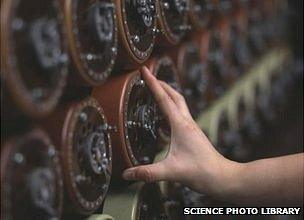
The bombe decryption machine - based on Turing's designs - was used to work out the daily settings of the German's Enigma machine in World War II
Remarkably, the Ace designs found their way into the Bendix Corporation's G-15 computer by way of Harry Huskey who had spent 1947 working on the Ace project at NPL.
The first Bendix G-15 ran in 1954, the year that Alan Turing tragically died.
Artificial Intelligence
In 1949, Turing became the deputy director of the Computing Laboratory at the University of Manchester where he focused on the software needed to drive the Manchester Mark 1 stored program computer. In 1950, he published a paper entitled Computing Machinery and Intelligence, in which he explored the notion of artificial intelligence.
In this paper, he posed the so-called Turing Test in which an artificial intelligence would be judged intelligent if another human could not tell the difference between the responses of a human and the artificially intelligent machine.
While this too-short and incomplete summary does not do justice to Alan Turing's immense contributions to the birth of computer science and computing, it has great personal resonance for me.
As it happens, I share the same birth date with Turing - mine is June 23 1943, when his code cracking was at a peak.
Even more coincidental, the first computer I ever got to programme was a Bendix G-15 at UCLA that my best friend, Stephen Crocker, was able to obtain access to in 1960 when we were both in our teens.
The Association for Computing Machinery (ACM) calls its highest award the Alan M Turing Award which includes a $250,000 (£160,000) prize that is partly subsidised by Google.
My colleague Robert Kahn and I were so honoured in 2004 with this recognition for our work on the internet.
'Creative genius'
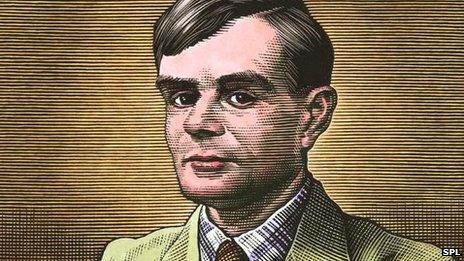
Turing's legacy continues to evolve, astonish, challenge and excite. His insights and fearless approach to daunting problems set benchmarks for decades to come.
His clarity of thought and creative genius infused those with whom he worked. His conceptual notions, such as the Universal Turing Machine, provided the basis for serious analysis of computability and decidability.
His practical realisations of computing engines, special systems like the bombe and general purpose ones such as Ace, shed bright light on the feasibility of purposeful computing and lit the way towards the computing rich environment we find in the 21st Century.
Had he lived to see 2012, one wonders what his thoughts might be and what new ideas he would challenge us to think about.
As my own journey into computing and networking continues to unfold, I find myself wondering and wishing that Turing were still around to consult.
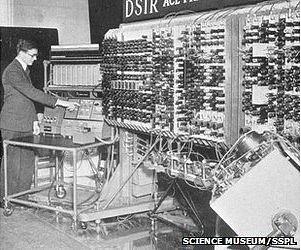
When plans to build Turing's Ace leaked the press dubbed the proposed computer a "giant brain"
His fresh way of articulating problems would surely cast new light on solutions.
Space travel
In addition to working towards higher speeds and more parallelism in computing and communications, I have spent some serious time thinking about and helping to formulate methods for communication across the long distances of the solar system.
My colleagues and I have had to re-think the basic communication paradigms for large scale networking owing to the slow nature of light speed propagation (eg 20 minutes one way from Earth to Mars) and disruption caused by planetary motion.
The problems only get worse when thinking about interstellar communication. Yet, these ideas must inevitably be confronted and solved as the human race continues its drive to expand beyond the planet of our origin.
Mortality is an affliction that limits our ability to explore our galaxy. Turing's ideas for artificial intelligence make one wonder whether the legacy of the human race will be intelligent robots that might be maintained in perpetuity to serve as our surrogates in a migration to the stars.
Celebrations
Turing is a hero to so many Google engineers, and we are deeply gratified to help commemorate and preserve his legacy.
Last year Google helped Bletchley Park raise funds to purchase Turing's papers so they could be preserved for public display in their museum.
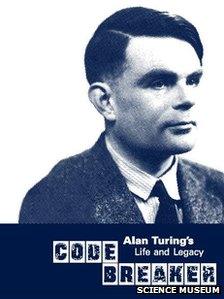
London's Science Museum will host an exhibition exploring Turing's life until June 2013
More recently, we've funded and collaborated with the London Science Museum as they put together their stunning new exhibition "Codebreaker: celebrating the life and legacy of Alan Turing".
They've gathered an amazing collection of artefacts - including items loaned by GCHQ, the government intelligence agency, that have never before been on public display. But the most impressive part isn't the items on show, but the way they're woven together to tell a story not just of his scientific achievements, but of the man himself.
It illuminates Turing, the man, and explains what he contributed in a profoundly moving way that anyone can understand.
I hope it will help make Turing a hero and household name beyond the technical community that reveres his memory.
Indeed, 2012 has been dubbed the "Alan Turing year" by the scientific community, with a series of events and lectures taking place all over the world. I'm personally taking part in several.
To celebrate his birthday (and mine!) I will be speaking at the Turing Centenary Conference in Manchester about his legacy in the networked world. I hope you'll join me - whether in person, or in spirit - in commemorating the life and work of this truly remarkable genius.
<italic>Vint Cerf is a computer scientist who co-designed the TCP/IP protocols used to create the internet's underlying architecture. He was later dubbed one of the "founding fathers of the internet". In 2005 he joined Google to help the search giant develop its network systems, and continues to serve as its chief internet evangelist.</italic>
- Published19 June 2012
- Published20 June 2012
- Published20 June 2012